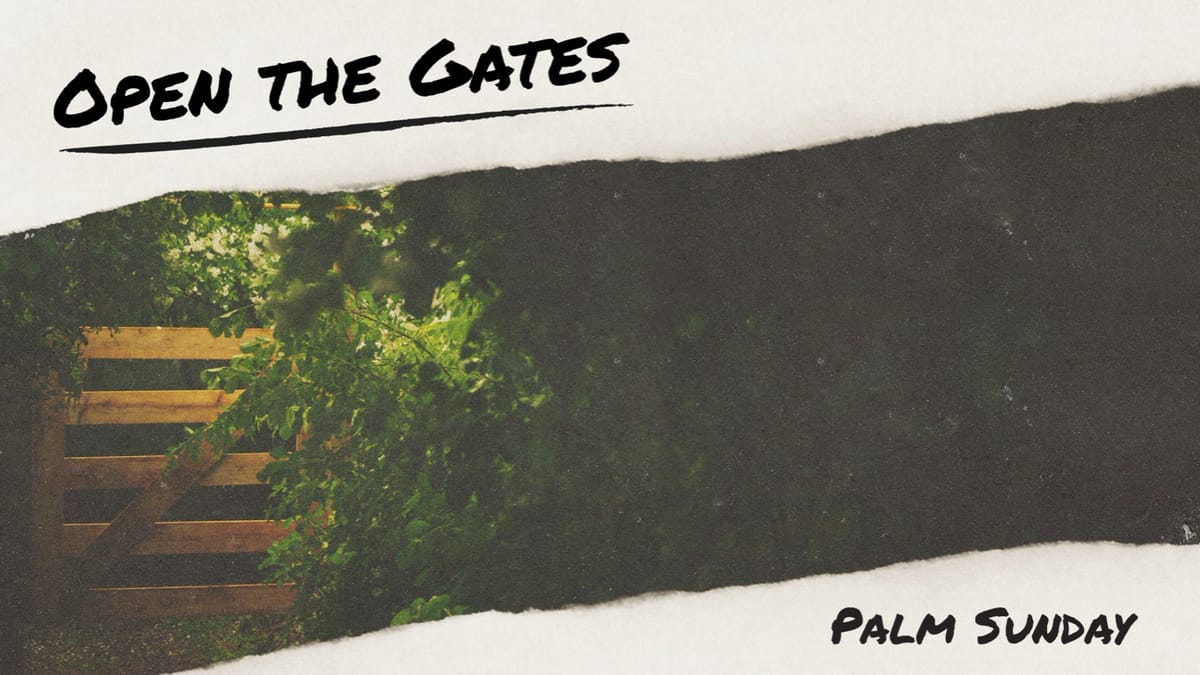Fairhaven Sermon 4-13-2025

Summary
In this week's service, Pastor Rev. Dylan Parsons delved into themes from Palm Sunday, drawing parallels between Advent and Lent. He noted how both seasons are characterized by penitence and preparation, with a focus on scriptural prophecies of Christ’s coming. Highlighting the similarities in song lyrics during these periods—such as "Glory to God in heaven" at Bethlehem transforming into "Peace in heaven" when Jesus enters Jerusalem—the sermon emphasized the importance of understanding who Jesus truly is and what His kingship means.
Rev. Parsons highlighted that while the crowd sang about peace and a warrior king, they misunderstood the nature of Christ’s mission. He pointed out how Fred Kahn's hymn writer perspective underscored the critical need for true peace on earth rather than just "peace in heaven." The pastor emphasized Jesus' weeping over Jerusalem due to their misunderstanding, and argued that as His followers, our focus should be on living a life governed by justice, mercy, and righteousness. This leads not only to immediate victory but also to eternal transformation.
The sermon concluded with the psalmist's call for righteous gates (Psalm 118) and the realization that true service to Christ involves more than just proclaiming His kingship; it requires walking in His footsteps through trials and sacrifices, ultimately leading to a transformed life.
Transcript
So occasionally, and this seems to happen, especially during church council meetings or if I'm doing the announcements at one of the other churches, I will misspeak and mix up Lent with Advent. So please don't listen carefully for it because I do it all the time, probably like 50% of the time. And when you live according to the church year, which by necessity I basically do, I'm always looking towards Advent or Lent, whatever's coming next, these seasons start to feel familiar in some ways, and these two particularly feel similar. They're both usually purple, right? The color both of penitence and royalty.
Both are about a month of preparation for the big day, right? both lean heavily on scripture that's prophesying what God is about to do for people who don't really get it. And in both Advent and Lent, there's this sense of quiet, of anticipation, of spiritual preparation, and one that really resonates with me. I like that. And this Palm Sunday, I really find myself focusing on those parallels.
Maybe because it's been cold and gray like a Pittsburgh December, it just feels like we're in Advent again. But for the first time ever, Palm Sunday feels to me like another moment in the year where we blanket the sanctuary with greenery, which we'll do later. Christmas Eve. It's not just the greenery.
It's not just the purple pyramids. What sticks out to me is the song, the proclamation that the crowd is bringing today. It sounds like Christmas. You remember the angels appearing to the shepherds in Bethlehem's fields, right? Luke chapter 2, what we always hear on Christmas Eve.
Nearby, shepherds were living in the fields, guarding their sheep at night. The Lord's angels stood before them. The Lord's glory shone around them, and they were terrified. But the angels said, Don't be afraid.
Look, I bring good news to you, wondrous, joyful news for all people. Your Savior is born today in David's city. He is the Lord. This is a sign for you.
You will find a newborn baby wrapped snugly and lying in a manger. And suddenly a great assembly of the heavenly forces was with the angel praising God. They said, glory to God in heaven and on earth peace among those he favors. That song there, that last line, glory to God in heaven, peace among those whom he favors.
That's where we get the words to angels we have heard on high. And in this song that the angels are singing, this heavenly host lights up the night sky, telling the shepherds of the coming of Jesus into the world and what that will mean for them, for us, for all creation. The disciples, the followers of Jesus, proclaim something very similar 30 years later as Jesus approaches the gates of Jerusalem on Palm Sunday. And this is how it goes in our reading today.
As Jesus approached the road leading down from the Mount of Olives, the whole throng of his disciples began rejoicing. They praised God with a loud voice because of all the mighty things they had seen. And they said..
. blessings on the king who comes in the name of the Lord, peace in heaven, and glory in the highest heavens. So two really interesting things are going on just in this brief passage. First, we know that line of the crowd song as well.
The first line, blessings on the king who comes in the name of the Lord. We say that during the communion liturgy, except we say it as it was actually written in Zechariah. Blessed is he who comes in the name of the Lord. There's no king in the prophet's words.
Because the people have slightly but very significantly changed what was originally prophesied. And that second line has undergone a similar sort of transformation. Notice the difference. So the heavenly host at Bethlehem sang, glory to heaven and on earth peace among those whom he favors.
In Jerusalem, what the people are singing is peace in heaven and glory in the highest heavens, which is similar to. But again, a distorted version of what was originally proclaimed. Because the people are experiencing and succumbing to this temptation that we ourselves face constantly. They're subtly changing Jesus into something they want him to be, while also obscuring what he wants us to be.
They're making him someone who will do something for them that doesn't really affect what they have to do. And this can be dangerous. The hymn writer, pastor, and missionary Fred Kahn, he's got a few hymns in our hymnal, he points this out particularly as it relates to that phrase, peace in heaven. That's what the crowd in Jerusalem is proclaiming as Jesus comes, peace in heaven.
Fred Kahn grew up in the Netherlands under Nazi occupation. He knew quite well the risk that comes with reshaping Jesus into something that he's not, no matter how subtly, into something we might prefer that he be. So as for peace, consider that it's a whole lot easier, a whole lot more straightforward for us if Jesus Christ means peace in heaven. because that's none of our business, really.
Peace in heaven, heaven's far away. Heaven's got nothing to do with us right now, but peace on earth is what the heavenly host proclaimed at Jesus' birth. And peace on earth is our business. that requires something of us.
It's a lot harder because it's in our control a little bit more day to day. So seeking peace, real peace, not just the absence of conflict, but peace, that's hard work. And yet the people sing peace in heaven as Jesus descends from the Mount of Olives into the holy city. because they don't really want peace on earth, after all.
That's not what these people are looking for. That's not what we're looking for most of the time. At the moment, they're longing for Jesus as he comes into Jerusalem to take his rightful place as a king over his people. They want him to throw out the Romans, their Herodian collaborators.
They want him to be this warrior king like his ancestor David. And so they say, blessed is the king who comes in the name of the Lord. They're not looking for peace, at least not in the short term. They're looking for reversal.
They're looking for revenge. And that's understandable. They've been oppressed. They've been occupied.
They have been exploited for generations now. And they think that this is a moment of revolution, that Jesus' entry into the city on the back of a colt marks the first spark that will lead to this final revolution, this final confrontation, victory for Israel. Our reading this morning stopped before it. But Jesus knows all of this, and it really grieves him.
The next two verses really reveal his pain over their misunderstanding of what he's there for. As Jesus came to the city, he observed it, and he wept over it. He said, if only you knew on this day of all days the things that lead to peace, but now they're hidden from your eyes. Jesus knows very well that peace is not on the immediate horizon.
We know that as Holy Week is before us, that those longing to see him on David's throne are in for a big disappointment in the next coming days. But perhaps Jesus' triumphal entry, as we often call Palm Sunday, happened 33 years before in the stable at Bethlehem as he entered into creation, God in human flesh. That's when he became king. His first triumph over the world, over death and sin, over Satan, was in his taking on of weakness and the frailty of a baby boy.
And there, in that moment, the angels announced his triumph, rightly, the way the people do imperfectly at Jerusalem's gates. And I don't mean this to be harsh on Jesus' crowd of followers. We make Palm Sunday a celebratory day for a good reason. They're absolutely right to celebrate, to call out in joy.
They lay down their cloaks, their palms on the road before him. And we shouldn't fault them at all for that because they know, they're completely correct that Jesus is their king. their mistake is just in understanding what kind of king he is and what that means for them, what that means for us. Christ as our king does not mean peace in heaven.
It's not abstract. It's not something far away that's distant from our daily living. If Christ is our king, it means peace on earth. It means that we, in our lives, are responsible for living with Jesus as our king.
In a reign of peace, of justice, of mercy, his law governs us right now. Not peace in heaven. Peace on earth. And that's a great victory.
That's what we celebrate on Palm Sunday. The triumph of God over darkness and evil. We're his subjects now. His kingdom is over all creation right now.
And that's why Jesus says, if the disciples weren't cheering for him, even the stones would cry out. All the world has received their king. But the coming of Jesus comes with obligations. First, that those who rule without seeking peace and righteousness are not kings at all, not at all legitimate, the same way Jesus is talking about Caesar, about Herod.
And all of those of us who would be followers of Jesus must be committed not only to calling him king, but to serving him as the kind of king that he is, offering our lives in justice and mercy and righteousness while seeking peace. And so the psalmist this morning sings out in Psalm 118, open the gates of righteousness for me so that I can come in and give thanks to the Lord. The people that are lined up from the road on the Mount of Olives were ready to march into the capital city behind this new king, but not necessarily into the gates of righteousness. They're ready to go into the gates of Jerusalem, but not necessarily the gates of righteousness behind their Savior.
The gates of righteousness are those we enter whenever we follow behind him as our Lord, walking in his footsteps, living in his way. These gates are wide open. We're welcomed into these gates today. And this really is a day of great celebration.
But the gates of righteousness don't necessarily open to a road that leads straight to the palace and the royal throne, but to cleansing the temple, facing down the authorities, this mockery of a trial, and then finally the cross. But still the road that the gates of righteousness opens to will lead us to this true king and as well as to a transformed life worth living. One that will never end. In the name of the Father and the Son and the Holy Spirit.
Amen.


